| Srl | Item |
| 1 |
ID:
142603
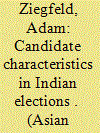

|
|
|
|
|
| Summary/Abstract |
Are certain kinds of candidates more likely to do better in elections than others? Using a unique dataset on the characteristics of candidates in elections in the north Indian state of Haryana, this study finds that certain candidate characteristics are associated with greater vote shares.
|
|
|
|
|
|
|
|
|
|
|
|
|
|
|
|
| 2 |
ID:
164382
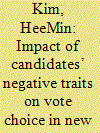

|
|
|
|
|
| Summary/Abstract |
The impact of candidates’ negative traits (CNTs) on voting behavior has received significant attention in election studies in recent decades. However, scholarly efforts have focused primarily on elections in advanced Western democracies, largely overlooking the relationship between candidates’ personal traits and the electorate’s voting behaviors in the context of new democracies. In this study, we fill this gap by investigating the impact of CNTs on the electorate’s vote choices in South Korean presidential elections. Our study of CNTs in South Korea shows that CNTs have statistically significant effects on the electorate’s vote choices. Our findings are particularly relevant because many new democracies are implementing fair and free elections, and the elites under previous authoritarian regimes are running in these elections.
|
|
|
|
|
|
|
|
|
|
|
|
|
|
|
|
| 3 |
ID:
149183
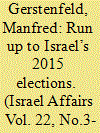

|
|
|
|
|
| Summary/Abstract |
The 19th Knesset dissolved itself on 8 December 2014. New elections were set for 17 March 2015. Polls taken immediately after the dissolution of the Knesset showed major public disaffection with Netanyahu. Yet in polls on hypothetical run-offs against other party leaders, Netanyahu was seen to win in all cases. Labour and Hatnuah ran together. So did four Arab parties. A new party, Kulanu, led by Moshe Kahlon, joined the contenders. Several parties held primaries. In the campaign, online videos played an increasingly important role. Polls during the final days and exit polls turned out to be unreliable. The Likud became the largest party in the 20th Knesset with 30 seats.
|
|
|
|
|
|
|
|
|
|
|
|
|
|
|
|
| 4 |
ID:
121628
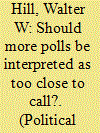

|
|
|
|
|
| Publication |
2013.
|
| Summary/Abstract |
During political campaigns the spread between the popularity of the candidates is a common metric capturing the state of the horse-race feature of the campaign. One candidate is said to be ahead of another by an indicated number of percentage points. If the difference is less than the margin of error, the race is considered too close to call. In two-person races, however, the spread corresponds to a much smaller confidence level than is usually reported because the two numbers used to compute the spread are not independent. The size of the confidence interval that is typically reported is incorrect by a factor of two. Therefore, some spreads that are reported as decisive are races too close to call.
|
|
|
|
|
|
|
|
|
|
|
|
|
|
|
|
| 5 |
ID:
094419
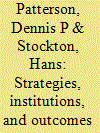

|
|
|
|
|
| Publication |
2010.
|
| Summary/Abstract |
During the five democratic elections held in Taiwan from 1992 to 2004 inclusive, the formerly dominant Kuomintang Party (KMT) was temporarily supplanted by the Democratic Progressive Party (DPP) as the nation's largest political party. Most explanations for this have focused on party fragmentation and the changing patterns of electoral competition it helped create. These are important factors, but they have not been tested empirically at the level where candidates won and lost legislative seats, the level of the election district. This article offers such an empirical test, and it will show that these two factors had a direct impact on the ability of DPP and KMT candidates to obtain legislative seats. We also show that these factors carried indirect impacts by hurting the ability of the KMT and DPP to nominate in a way that they would obtain all the seats that their obtained vote shares would allow.
|
|
|
|
|
|
|
|
|
|
|
|
|
|
|
|
| 6 |
ID:
131691


|
|
|